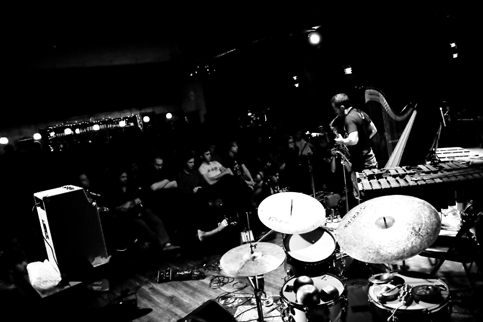Artists Against Apartheid: radio broadcast
- CKUT community radio special broadcast

- Monday January 18th 15h00 – 17h00
live broadcast on CKUT radio, 90.3fm
tune-in globally via live stream at www.ckut.ca


On 29 December 2009, the High Court of Justice ordered, by majority opinion, cancellation of the ban on Palestinian movement along the section of Route 443 that lies beyond the Green Line. Justice Uzi Fogelman, who wrote the majority opinion, held that the military commander is not authorized to impose such a ban, and additionally, that it is not proportionate. The justices give the military commander five months to formulate an alternate solution that will provide security to Israelis using the road.
In the past, the relevant section of the road was a main traffic artery in the southern part of Ramallah District. Over the years, the route was widened and changed, and in the 1980s, Israel repaved it. The widening of the road was accomplished by expropriating public and private land of Palestinians from the adjacent villages. In its response to the petitions filed by the Palestinian landowners, the High Court held that these expropriations were legal inasmuch as the road was intended to also serve the Palestinian residents.

(Jerusalem) – The Israeli military appeals court should end the administrative detention of Mohammed Othman, a West Bank rights activist, and order his release, Human Rights Watch said today.
Israeli authorities have detained Othman without charge for more than two months on what appear to be politically motivated grounds. On the basis of secret evidence that Othman and his lawyers were not allowed to see, a military court confirmed a military order that consigned Othman to three months administrative detention without charging him with any crime. Othman has no criminal record and, to the knowledge of Human Rights Watch, has never advocated or participated in violence. His detention period, which may be renewed, ends on December 22.


Photo: Valerian Mazataud Palestinians in Bil’in raise Palestinian flag at weekly protest.
On International Human Rights Day in 2008, my husband Abdallah Abu Rahmah was in Berlin receiving a medal from the World Association for Human Rights. Last year on the same day, December 10th, Abdallah was taken away at 2am by Israeli soldiers who broke into our West Bank home. Abdallah was arrested for the same reasons he received the prize – his nonviolent struggle for justice, equality and peace in Israel/Palestine.
My husband is a school teacher and farmer from the Palestinian village of Bil’in. When Israel built its apartheid wall here, it separated Bil’in from more than half of its land, in order to facilitate the expansion of the illegal settlement Mattityahu East. In response, Abdallah and fellow villagers began a campaign of nonviolent resistance. Every Friday for the past five years, we’ve marched, with Israeli and international supporters, to protest the theft of our land and livelihoods.

Photo: Valerian Mazataud Lhasa de Sela performs at Artists Against Apartheid.
Music lovers around the world are mourning the passing of singer Lhasa de Sela, who died on January 1st, 2010 at home in Montreal. A beautiful voice, a beautiful spirit who’s music moved many and also actively maintained strong connections to grassroots movements for social justice.
Above is a photo taken last June at the Suoni per il Popolo festival where Lhasa de Sela performed with Esmerine at an Artists Against Apartheid concert for Palestine. Soon a recording of Artists Against Apartheid VIII featuring Lhasa de Sela will broadcast on CKUT community radio in Montreal, stay tuned for details.

(Cairo) Gaza Freedom Marchers approved today a declaration aimed at accelerating the global campaign for Boycott, Divestment and Sanctions (BDS) against Israeli Apartheid.
Roughly 1400 activists from 43 countries converged in Cairo on their way to Gaza to join with Palestinians marching to break Israel’s illegal siege. They were prevented from entering Gaza by the Egyptian authorities.
As a result, the Freedom Marchers remained in Cairo. They staged a series of nonviolent actions aimed at pressuring the international community to end the siege as one step in the larger struggle to secure justice for Palestinians throughout historic Palestine.
